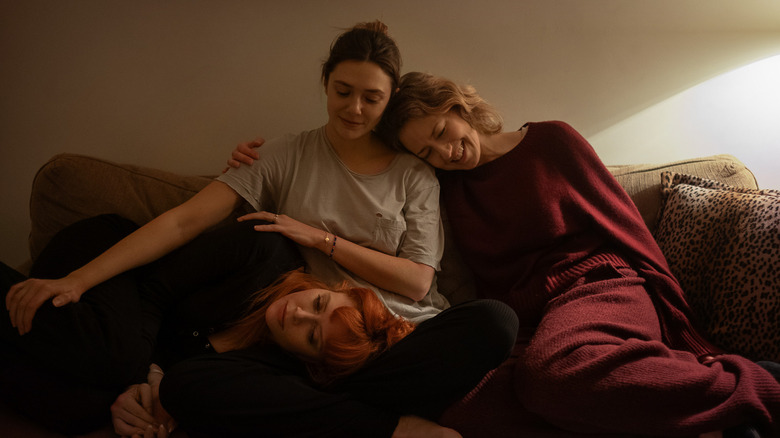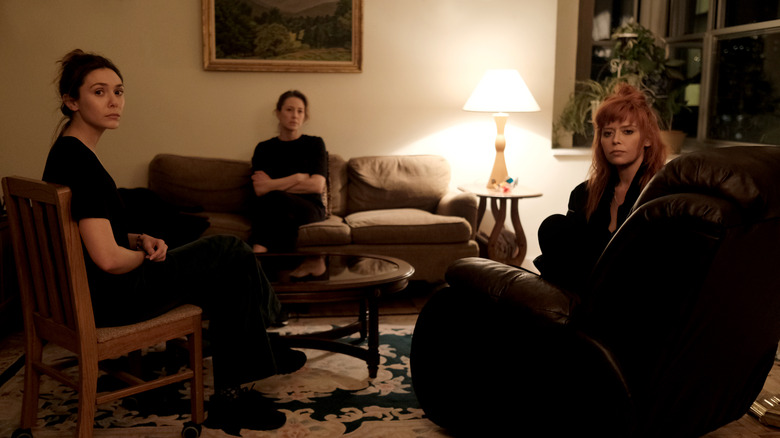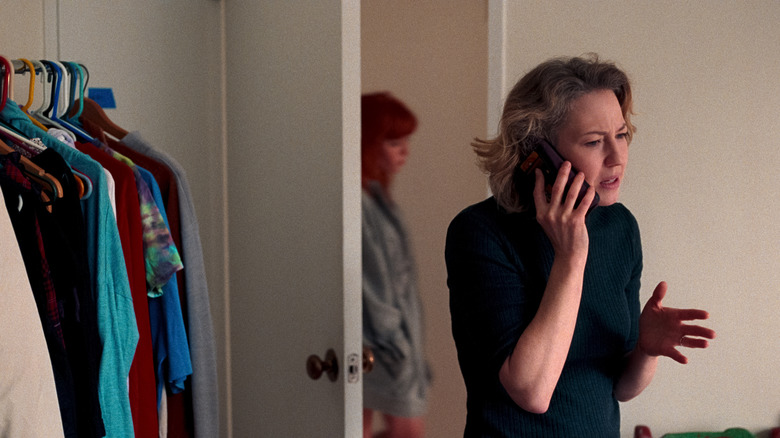His Three Daughters Review: Carrie Coon, Natasha Lyonne, And Elizabeth Olsen Are Magnificent In This Emotional Drama
What a joy it is to watch great actors work. "His Three Daughters" is many things, but most of all it's a wonderful showcase for its three leads, Carrie Coon, Natasha Lyonne, and Elizabeth Olsen. Coon, Lyonne, and Olsen do arguably the best work of their careers here, turning in three nuanced, layered performances and creating characters that feel achingly authentic. You have likely met people exactly like the characters portrayed here. You might even see yourself within them. As I watched the three leads build their respective characters from the ground up, I was taken aback at how familiar they all seemed. "I know these people," I thought. "I've met them before."
Writer-director Azazel Jacobs has created a stirring, emotional drama; a film about grief, and all the warring emotions that come with it. Anyone who has gone through the experience of losing a loved one — and that's pretty much all of us, isn't it? — will recognize something here. This is a movie about death, but it's not an endlessly dour experience. It's funny, it's upsetting, it's real. And at the center of it all are those three performances, pulling us through a rollercoaster of emotions. This material could easily be translated to the stage, but it doesn't feel stagey. Jacobs' direction lets the space the characters inhabit — a roomy but small New York apartment — feel cinematic, from the way we enter some rooms while never seeing others. Long shots of windows and uninhabited spaces speak volumes without a word.
"His Three Daughters" does an incredible job setting things in motion with its opening scene, telling us almost everything we need to know about the three leads: Carrie Coon's Katie, who rattles off a nervous monologue; Natasha Lyonne's Rachel, who sits silently and doesn't even attempt to get a word in; and Elizabeth Olsen's Christina, who seems to be entirely in her own world. These three characters are sisters — we eventually learn that only Katie and Christina have the same mother, but all three share the same father, and that father, Vincent, is dying. Jacobs keeps Vincent off screen for almost the entire movie — Katie and Christina visit him as he lays on his deathbed in his bedroom, but we, the audience, never go in there. Neither does Rachel. She'll stand in the doorway, but never go into the room herself. Katie, the more prickly of the three sisters, resents this, seeming unwilling to process the fact that confronting her dying father might be too much for Rachel to handle.
Perception is a big part of His Three Daughters
Perception is a big part of "His Three Daughters." When the film begins, Katie seems mean spirited, Rachel seems distant and aloof, and Christina badly wants to avoid any confrontation. Yet as the movie progresses, we learn more about these women, and they learn more about each other. We learn what drives them, what colors their thoughts, and how they make assumptions about one another. All of their actions are influenced by their history together, but also by grief itself. Katie wants to control an uncontrollable situation, Christina wants to make peace, and Rachel would seemingly like to not deal with anything at all. All of these approaches in the face of impending death are valid and understandable.
Day after day, hospice worker Angel (Rudy Galvan) visits the apartment and gives the sisters the same dire prognosis: Vincent is going to die at any moment. But anyone who has been around a dying relative can tell you that so-called "natural" death isn't quick; it is a slow, painful process. You want it to be over quickly, and then you hate yourself for having that very thought. Every second counts, and every second can feel like an eternity. There are a million little things to do to deal with the process of it all. The minuta of dying becomes darkly comical; farcical.
The three leads are masterful in how they handle their characters; how they show us how these characters process grief in their own distinct ways. Coon is great at making us dislike Katie, only to then understand her. Olsen's Christina seems to be the sister who bottles up her emotions the most, lest she explode and upset everyone. Katie and Christina, who share a mother, spend most of their time together and seem at odds with Rachel. But Rachel, who is constantly getting high and hiding out in her room, is slowly revealed to be the sister who was closest to Vincent — she lived with him, she cared for him, she did everything she could on her own until death become inevitable.
His Three Daughters never feels manipulative
Material like this could descend into misery or anger. Indeed, there are more than a few moments where the sisters go at it, raising their voices and even coming close to blows. But "His Three Daughters" finds ways to avoid being a dour slog. There's humor here, in the ways the character handle their emotions, in the ways they react to things, in the ways they behave overall. You won't walk away from "His Three Daughters" feeling a sense of overwhelming sadness. But there are emotionally wrenching moments here that will likely reduce you to tears. That comes with the territory.
Death is inevitable. We all have to grapple with it at some point. "His Three Daughters" understands this, but has a precise way of showcasing the emotions surrounding that inevitability. The film never feels manipulative. It never cheats. Sure, characters have monologues, but they never feel cheap or performative. They simply come across as real. None of this would be as successful without the magnificent work of Coon, Lyonne, and Olsen, who never strike a false note here. Nothing feels staged, everything feels genuine. Here are three great performances that never feel like performances, and that's pretty damn remarkable.
/Film Rating: 8 out of 10
"His Three Daughters" is now playing in select theaters and will be streaming on Netflix on September 20, 2024.


